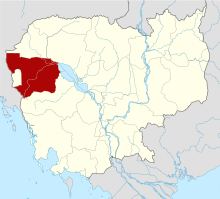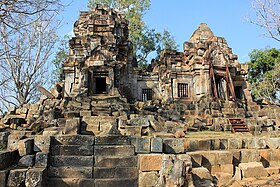Battambang province
Battambang
បាត់ដំបង | |
|---|---|
| Battambang Province ខេត្តបាត់ដំបង | |
|
From top: Phnom Sampov, Wat Banan, Wat Sangkae, Kamping Puoy Lake | |
 Map of Cambodia highlighting Battambang province | |
| Country | |
| Provincial status | 6 December 1907 |
| Capital | Battambang |
| Subdivisions | 1 municipality; 13 districts |
| Government | |
| • Governor | Sok Lou (CPP) |
| • National Assembly | 8 / 125
|
| Area | |
• Total | 11,702 km2 (4,518 sq mi) |
| • Rank | 5th |
| Population (2023)[1] | |
• Total | |
| • Rank | 5th |
| • Density | 85/km2 (220/sq mi) |
| • Rank | 16th |
| Time zone | UTC+07:00 (ICT) |
| ISO 3166 code | KH-2 |
| Website | www |
| Battambang Province | |
|---|---|
| Khmer name | |
| Khmer | បាត់ដំបង UNGEGN: Khétt Bătdâmbâng ALA-LC: Khett Pâtṭaṃpang IPA: [kʰaet ɓatɗɑmɓɑːŋ] |
Battambang (Khmer: បាត់ដំបង, Bătdâmbâng [ɓatɗɑmɓɑːŋ], lit. 'The Lost Stick') is a province of Cambodia in the far northwest of the country. Bordering provinces are Banteay Meanchey to the north, Pursat to the east and south, Siem Reap to the northeast, and Pailin to the west. The northern and southern extremes of the province's western boundaries form part of the international border with Thailand. In addition, Tonlé Sap forms part of the northeastern boundary between Siem Reap and Pursat. Its capital and largest city is Battambang.
It is the fifth most populous province in Cambodia.[1] In land area, Battambang is the fifth largest province of Cambodia. Battambang is one of the provinces included in the Tonle Sap Biosphere Reserve.[2] The province's fertile rice fields have led to a mostly agricultural economy giving rise to the moniker "the rice bowl of Cambodia". The province features a range of cultures as well as natural resources. Seventy five percent of the area is jungles and mountains. The area has a tropical climate.
Etymology
[edit]
Battambang literally means '[to] lose [a] stick' in Khmer, referring to the local legend of Preah Bat Dambang Kranhoung. No stone inscriptions from the pre-Angkorian and Angkorian eras have yet been discovered containing mention of any contemporary villages or districts called "Battambang", but according to the document Mohachun Khmer, Srok Battambang (Battambang District) was used during the Angkor and post-Angkor eras. In Thai, the province is called Phra Tabong.
History
[edit]Battambang was annexed by both Siam and Cambodia from time to time because its location is in between both kingdoms. A majority of the local population is of Khonpor or Chong ethnicity, a part of the Austro-Asiatic family.[citation needed]
In 1769, Battambang and Siem Reap were conquered by King Taksin of Siam. On March 23, 1907, Battambang, with Siem Reap and Koh Kong, were annexed to French Indochina. During World War II it was annexed to Imperial Japan before being handed over to Thailand. After the war ended, it was returned to an independent Cambodia.
Governors
[edit]-Annexed to Siam (1795-1907)
1 Baen (បែន) 1795-1809
2 Pen (ប៉ែន) 1809-1816
3 Rous (រស់) 1816-1835
4 Norng (នង) 1835-?
5 Yea (Nhonh) យារ (ញ៉ុញ) ?-1894
6 Chhum (ឈុំ) 1894-1907
-Returned to Cambodia by France (1907-1941)
7 Aem Arun (អែម អរុណ) 1907-1922
8 Chea (ជា) 1922-1927
9 Noun (នួន) 1927-1934
10 Chong Toun (ចុង ទួន) 1934-1939
11 Meas Nal (មាស ណាល់) 1939-1941
-Recaptured by Siam during Japanese Occupation (1941-1946)
12. Phromyothi (ព្រហ្មយោធី) 1941-1946
-Returned to Cambodia and independent from France
13 Lon Nol (លន់ នល់) 1946-1947
14 Sin Chhoy (ស៊ីន ឆយ) 1947-1948
13 Lon Nol (លន់ នល់) 1948-1949 (2nd term)
15 Tep Phan (ទេព ផន) 1949-1951
16 Pho Preung (ផូ ព្រឿង) 1951-1954
17 Chay Thol (ចាយ ធុល) 1954-1956
15 Tep Phan (ទេព ផន) 1956-1959 (2nd term)
18 Tim Ngoun (ទឹម ងួន) 1959-1966
19 Yem Monitoth (យ៉ែម មុនីរ័ត្ន) 1966-1967
20 In Tam (អ៊ិន តាំ) 1967-1968
18 Tim Ngoun (ទឹម ងួន) April-October 1968 (2nd term)
21 Sek Somoeut (សេក សំអៀត) 1968-1974
22 Sar Hor (សារ ហោ) 1974-January 1975
21 Sek Somoeut (សេក សំអៀត) January -April 1975 (2nd term)
-Khmer Rouge (1975-1979)
22 Rous Nhim (រស់ ញឹម) 1975-1978
23 Ta Mok (តាម៉ុក) 1978-1979
-Kampuchea (People’s Republic)
24 Keo Thy (កែវ ធី) 1979-1980
25 Lay Samon (ឡាយ សាម៉ុន) 1980-1982
26 Sum Sat (ស៊ុំ សាត) 1982-1984
27 Ke Kim Yan (កែ គឹមយ៉ាន) 1984-1986
28 Sok Saran (សុក សារ៉ាន់) 1986-1991
-Kingdom of Cambodia
29 Ong Sami (អ៊ុង សាមី) 1991-1999
30 Nov Sam (នៅ សំ) 1999-2001
31 Brach Chan (ប្រាជ្ញ ចន្ទ) 2001-2014
32 Chan Sophal (ច័ន្ទ សុផល) 2014-2017
33 Ngoun Ratanak (ងួន រតនៈ) 2017-2021
34 Sok Lou (សុខ លូ) 2021-incumbent
Administrative divisions
[edit]Battambang is divided into 13 districts and one municipality which are further subdivided into 92 communes (Khmer: ឃុំ, khum), 10 quarters (Khmer: សង្កាត់) and 810 villages (Khmer: ភូមិ, phum).
| ISO code |
Name | Khmer | Population (2019)[1] | Subdivisions | |
|---|---|---|---|---|---|
| — Municipality — | |||||
| 02-03 | Battambang | បាត់ដំបង | 119,251 | 10 sangkat | |
| — District — | |||||
| 02-01 | Banan | បាណន់ | 86,486 | 8 khum | |
| 02-02 | Thma Koul | ថ្មគោល | 105,982 | 10 khum | |
| 02-04 | Bavel | បវេល | 92,306 | 6 khum | |
| 02-05 | Aek Phnom | ឯកភ្នំ | 71,120 | 7 khum | |
| 02-06 | Moung Ruessei | មោងឫស្សី | 103,841 | 9 khum | |
| 02-07 | Rotanak Mondol | រតនមណ្ឌល | 38,848 | 4 khum | |
| 02-08 | Sangkae | សង្កែ | 111,118 | 10 khum | |
| 02-09 | Samlout | សំឡូត | 43,715 | 7 khum | |
| 02-10 | Sampov Loun | សំពៅលូន | 37,323 | 6 khum | |
| 02-11 | Phnum Proek | ភ្នំព្រឹក | 44,741 | 5 khum | |
| 02-12 | Kamrieng | កំរៀង | 53,076 | 6 khum | |
| 02-13 | Koas Krala | គាស់ក្រឡ | 30,192 | 6 khum | |
| 02-14 | Rukhak Kiri | រុក្ខគិរី | 42,329 | 5 khum | |
Local government entities within the province include the two towns and 12 subdistrict municipalities.
Religion
[edit]Religion in Battambang (2019 census)[1]
The state religion is Theravada Buddhism. More than 98.3% of the people in Battambang are Buddhists. Chams have been practicing Islam for hundreds of years. A small percentage follow Christianity.
Historical sites
[edit]
Wat Ek Phnom
[edit]Wat Ek Phnom (Khmer: វត្តឯកភ្នំ) is a partly collapsed 11th century temple 11 km north of Battambang city. The temple measures 52 m by 49 m and is surrounded by the remains of a laterite wall and an ancient baray (reservoir). A lintel depicting the Churning of the Ocean of Milk is above the east entrance to the central temple, the upper flanks of which hold some finely carved bas-reliefs. Construction of an oversized Buddha statue began by locals next to the temple has been stopped by the government because, they say, it mars the site's historical provenance and "timeless beauty".[3]
Wat Banan
[edit]Wat Banan (Khmer: ភ្នំបាណន់), some 25 km south of Battambang city, has been likened to a smaller version of the more imposing Angkor Wat. The 11th century Angkorian mountain ruin of Phnom Banan is one of the best preserved Angkorian Khmer temples around Battambang province. As you approach you will see the distance five tower pointing skyward, Like a small version of Angkor Wat. At the base of the mountain you can faced with a step laterite staircase flanked by nagas. After climbing the 350+ steps you are treated to a wonderfully peaceful setting.
National Bank Colonial Building
[edit]Transportation
[edit]Battambang is accessible by road, and by boat via the Sangkae River. National Highway 5 runs straight through the province. Both the airport and railway line are not in use. Buses make 5-6 hour journey from Phnom Penh and the 3-4 hour journey from Siem Reap almost hourly.
Notable people
[edit]- Keo Rumchong - Cambodian kickboxer
- Chhut Serey Vannthong - Cambodian kickboxer
References
[edit]- ^ a b c d "General Population Census of the Kingdom of Cambodia 2019 – Final Results" (PDF). National Institute of Statistics. Ministry of Planning. 26 January 2021. Retrieved 3 February 2021.
- ^ "tsbr-ed.org". www.tsbr-ed.org. Archived from the original on 5 September 2008. Retrieved 7 April 2018.
- ^ Wat Ek Phnom at Lonely Planet Archived March 15, 2010, at the Wayback Machine
External links
[edit]- Battambang - The Rice Bowl of Cambodia (Official Website of the Provincial Town Battambang on www.battambang-town.gov.kh) (in Khmer and English)
- Battambang Provincial Resources
- Beyond Angkor: Historical Sites in Battambang Province - Unique Graphical Interactive Maps





